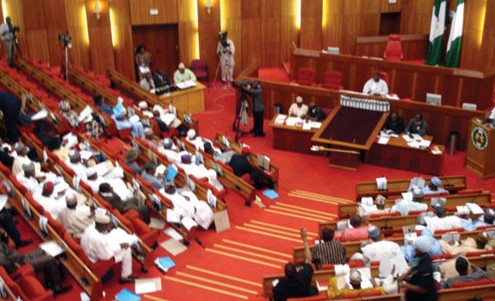*Sell-Offs Push NT-Bills Average Yield Higher W-o-W To 25.48%-Analysts
Fears of imminent U.S economic recession began to manifest as oil futures extended losses in a volatile session on Monday, trailing a stock market selloff
Share markets, according to Reuters, tumbled across Asia as U.S. recession fears sent investors rushing from risk assets while wagering that rapid interest rate cuts will be needed to drive economic growth.
Added to the global oil glut, the Federal Reserve has announced plans to cut interest rates by 25 basis points at its next meeting, a development that should also work favourably for the Nigerian economic interests.
However, the likely opportunities for the Nigerian economy are being viewed with mixed reactions following increased apprehension and heightened tension ocassioned by protests currently rocking the country.
Some analysts say the heightened wariness among global investors is likely to lead to delays in investment inflows into Nigeria, as investment committees adopt a cautious approach
as events unfold.
Such delays, they further argue, could significantly impact the timelines of major economic activities like the achievement of $1 trillion GDP, Bank recapitalisation plans, as well as urgent need to rev up economic activities by president Bola Tinubu administration to douse tension and improve the lives of the citizens under his Renewed Hope Agenda.
The analysts were unanimous in their submissions that it is obvious that the foreign investors are viewing contradictory and de-marketing statements by government officials even against local investors and policy summersaults with delicate balance between maintaining confidence in the local economy and addressing the practical challenges posed by the current economic landscape, affecting overall stability and growth prospects of the Nigerian economy as well as the financial sector.
To bolster foreign economic growth anchored on real investments, president Tinubu has been globe trotting, canvassing for investments,while several banks have embarked on international roadshows and are actively engaging with potential investors for seamless recapitalisation.
But, the fear of global market contagion is growing and compounding the challenges already on ground.
Specifically, the U.S. recession concerns were stoked by Friday’s weak July payrolls report of Chinese demand concerns that have been lingering in the oil market for some time.
Slumping diesel consumption in China, the world’s biggest contributor to oil demand growth, is also weighing on oil.
But even with the latest selloff, oil has still underperformed many major stock exchanges in 2024.
Since the beginning of the year the Nasdaq 100 has risen 11% and the FTSE 3%, while Brent crude is down 0.3%
Oil has also been pressured by the decision of the OPEC+ group of producers to stick to its plan to phase out voluntary output cuts from October, which means that supplies will rise later this year, analyst say.
OPEC oil output rose in July despite production cuts by the group, a Reuters survey showed on Friday.
But, analysts are looking forward to the effectiveness of the marching order to the Nigerian military to curb crude oil theft so as to enable government ramp up oil daily production to two million barrels per day and beyond.
ALSO READ:Government Imposes 24-Hour Curfew In Kaduna
Sell-Offs Push NT-Bills Average Yield Higher W-o-W To 25.48%-Analysts
As expected, the Nigerian Treasury Bills (“NT-Bills”) secondary market sustained a bearish position last week, as depressed system liquidity (which stood at ₦53.39bn as of Monday, 29-Jul-24) spurred negative investor sentiments in the market, according to analysts at Afrinvest Securities.
Consequently, average yield rose 25bps W-o-W to settle at 25.48% from 25.23% recorded in the previous week.
Investors freed up positions across the yield curve, resulting in average yield increases of 10%, 12%, and 17% w-o-w respectively on the short to long end of the curve. The 13-MAR-25 and 24-APR-25, saw the most selloff as their average yields expanded 134bps and 195bps w-o-w respectively.
The analysts say that on Wednesday, 07-Aug-24, the Apex bank is scheduled to roll over a total of ₦216.09bn across the 91- 182- and 364-Day tenors in the Primary Market Auction (“PMA”).
”We expect demand to remain tilted towards the longer-dated bill as investors seek attractive yields to compensate for the hike in Monetary Policy Rate (“MPR”) from 26.25% to 26.75%.
Going into the week, we expect quiet trading sessions at the beginning of the week in anticipation of the NT-Bills PMA and the outcome of the PMA to buffer system liquidity (which stood at ₦660.48bn long as of Friday, 02-Aug-24) and thus, we might witness a mild-bearish outing in the market this week.
We advise investors to position relatively attractive bills across the yield curve while remaining alert for possible corporate offerings.”
On the domestic bond secondary market, they noted that it also ”faced sell pressure last week as investors continued to react to the 50bps uptick in MPR from 26.25% to 26.75%. Consequently, average yield rose 32bps w-o-w to 19.77% compared to the previous week’s figure of 19.45%.
In detail, selloffs were observed across the curve, as average yield advanced by 48bps, 13bps, and 23bps at the short, mid, and long ends respectively. The APR-2029, MAY-2029, and JUN-2038 saw the most selloff, rising by 121bps, 101bps, and 97bps w-o-w respectively.
Going into the week, we expect sustained selloffs in the bond market as system liquidity remains pressured. Investors are advised to cherry-pick attractive yields, particularly at the short end of the curve.”













